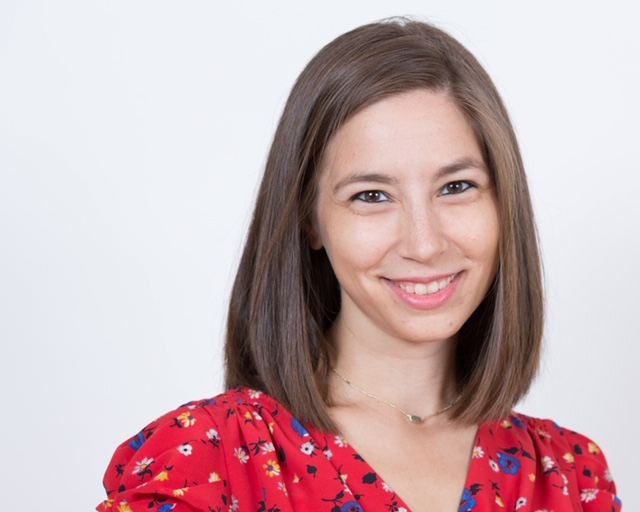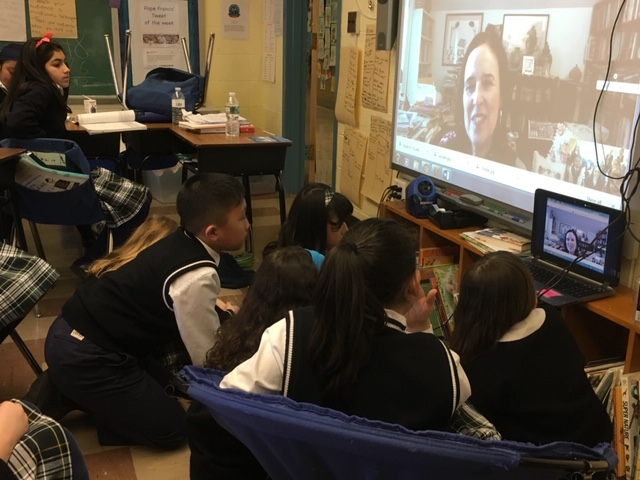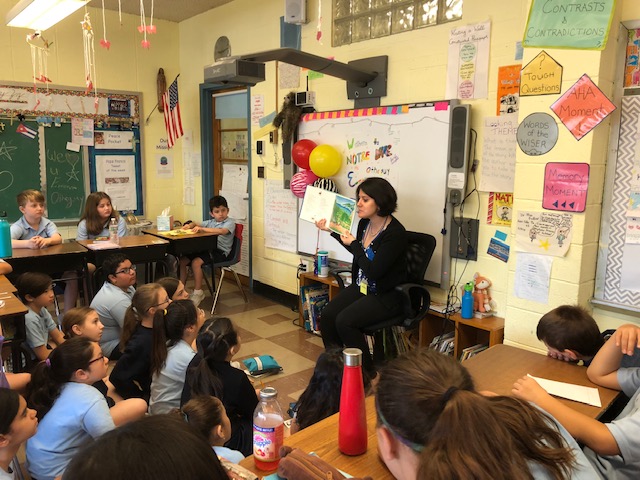NJ Teacher Creates Global Connections
Julia Guthrie uses technology and kid lit to bring the world to her classroom and students.
Most parents want to give their kids the world. But the moms and dads of children in Julia Guthrie’s class are getting a lot of help.
Guthrie, who teaches fourth grade at Notre Dame Academy in Palisades Park, NJ, brings the world to her classroom. Wielding technology, along with kid lit, she connects her students to others like them from around the globe.
 |
Julia Guthrie |
Perhaps most significantly, these are not one-off, standalone events wedged into the jam-packed schedule of a school year. Each book discussion, Skype session, or author visit is designed to lead to further research, a collaborative project, or the anticipation, delight, and meaningful correspondence that come with sending postcards back and forth across the world. She lets it go where the students take it—and often that’s straight to real and lasting connections that have an impact on them.
“It’s one of my biggest passions,” says Guthrie, who was named the 2018 New Jersey Nonpublic Teacher of the Year. “And what better way to connect than by bonding over a good book?”
Her efforts aren't designed to be a formal program. “It's just how we choose to live our lives,” she says. “I don't want this to seem like a gimmick to the kids, so it's just infused with our curriculum.”
Guthrie uses many tools to fulfill that passion and open up the world to her students:
The Global Read-Aloud
Through this program (theglobalreadaloud.com), students across the world read the same book and are encouraged to connect with other classrooms. “We’ve been matched with classes all over the U.S. and abroad, sometimes forging long-term relationships simply as a result of sending each other postcards about what we’re reading,” Guthrie says.
 |
Connections being made with an author during a Skype visit to Guthrie's classroom. |
Her students are not only bond over books, but learn about the day-to-day lives of their international peers via Skype, Google Hangouts, and FlipGrids.
Twitter and YouTube
Don’t underestimate Twitter, says Guthrie. “I find many classes to connect with,” she says. “Any teacher can and should try this.”
One of Guthrie’s favorite connections, to a school in Australia that bears similarities to her own, was made through Twitter. Guthrie’s class and the Australian group each picked a book that they felt represented the best of their own country: My Dog is Lost by Ezra Jack Keats and Patt Cher and I'm Australian, Too by Mem Fox, respectively.
Students shared the books via YouTube recordings to avoid the exorbitant cost of shipping. The Australian class shared first, and their book pick informed Guthrie’s class’s selection. “We thought it addressed similar themes,” she says. “We wanted to show that like Australia, America is also home to people from many different backgrounds who live, work, and play together.”
“In our respective classrooms, we talked about global citizenship. Then we connected to each other,” recalls Guthrie. “We used Buncee to share our thoughts on global citizenship and made an iMovie tour of our school, while the Australian students filmed a game show that they performed for a school-wide assembly. It was probably the most meaningful thing I've ever been a part of.”
The experience resonated strongly with students, too. They wanted to research Australia further, and wound up learning about climate change, colonialism, and other big-picture issues related to the continent.
“It's one thing to read about the devastation of the coral reefs,” she says. “It's another thing to be able to talk to people who live right near the Great Barrier Reef and are incredibly knowledgeable about the problems presented by its loss."
UN Global Goals
Another rewarding global-connection project for Guthrie’s class has been their work with the UN Global Goals.
Students all around the world study the United Nations’ plan to improve life on planet Earth drastically by 2030 in a sustainable way by reading the organization’s stated Global Goals. Then they share their ideas.
Guthrie’s students have partnered with classes via video chats to share books that relate to one of the goals. For example, they paired The Water Princess by Susan Verde and Peter H. Reynolds and A Thirst for Home by Christine Ieronimo with goal number six: Clean Water and Sanitation.
“After sharing the book, sometimes we'll talk about how this issue manifests itself where we live, sometimes we'll work on a collaborative project, and sometimes we'll just talk and enjoy a discussion about whatever we just read,” says Guthrie.
It’s proven to be an effective way to see how what may appear to be regional issues affect everyone.
nErDcamps
At nErDcamps , hundreds of teachers, librarians, and children’s authors hash out ways to get kids reading and writing. Unlike traditional professional development conferences, these events encourage any attendee lead a session about a successful initiative.
 |
Author Emma Otheguy visits Guthrie's class. |
“In teacher parlance, it's less ‘sage on the stage’ and more ‘guide on the side,’” says Guthrie. Several of these events have popped up across the United States, including nErDcampNJ, which Guthrie co-organizes.
The biggest boon has been meeting like-minded educators. “It’s amazing to open a messaging app when I have a problem and access people who are as passionate about literacy as I am,” she says.
A close second are the author collaborations. Guthrie’s most memorable was with Emma Otheguy, writer of Marti's Song for Freedom and the upcoming Silver Meadows Summer.
“Her author visit led us to a fascinating study of global revolutions born of social injustices,” says Guthrie, who is of Puerto Rican, Irish, and Chinese descent. “A lot of Emma's work centers around the beauty of existing as a person with dual cultures, so it was a celebration of us— a classroom full of children who speak another language at home, who bring many different traditions to our classroom, who feel at home in multiple worlds.”
Tips for forging global connectionsFlexibility is your friend. With technology, things can and do go wrong—like the time when Guthrie’s microphone failed. “We had to communicate via dry-erase boards because the class couldn’t hear our audio,” she says. On another occasion, Skype konked out due to a storm in another part of the world. “Be ready and willing to quickly change your plans!” Guthrie urges. Triple-check time zones when scheduling virtual visits. “I once scheduled a meetup for 4 a.m.,” says Guthrie. Don’t forget the basics. Be sure to build in a lesson about digital citizenship beforehand so that students know what is and is not appropriate. |
RELATED
The job outlook in 2030: Librarians will be in demand
The job outlook in 2030: Librarians will be in demand
ALREADY A SUBSCRIBER? LOG IN
We are currently offering this content for free. Sign up now to activate your personal profile, where you can save articles for future viewing






Add Comment :-
Be the first reader to comment.
Comment Policy:
Comment should not be empty !!!